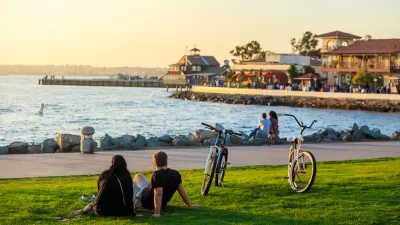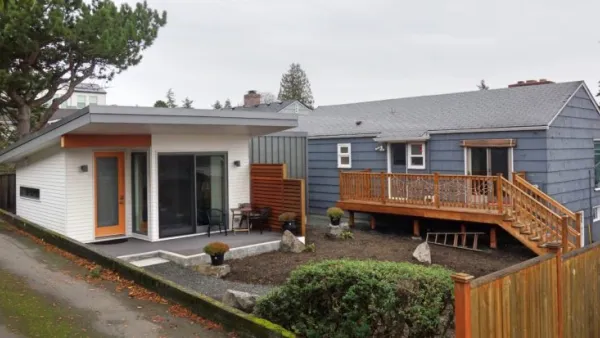The short-term Quartyard pop-up park in San Diego's East Village reflects the changing attitudes of the oft conservative San Diego Planning Department.
As discussed on CityLab by Roxana Popescu, the new Quartyard pop-up park stemmed from an architectural graduate student thesis in 2013 by David Loewenstein, Adam Jubela, Jason Grauten, and Philip Auchettl. Noticing an empty lot catty corner from their school's campus, they envisioned transforming it to a temporary hang-out space from upcycled shipping containers.
To make this dream come to fruition in the fall of 2013 "the team—now called RAD Lab—raised $60,000 through Kickstarter. That money was useful, but proving to the city and investors that San Diegans were excited about the idea was even more valuable, Loewenstein said; the project has since received another $450,000 from a few investors."
As the city has plans to use the empty lot to build a mixed-use development including affordable housing, the project had a quick build, "going from the seed of an idea to groundbreaking in little more than a year, and fittingly, has a short life expectancy. Its lease is for two years, extendable yearly after that."
Bill Fulton, former San Diego planning director, noted how in San Diego there is "a very conservative culture, which is reflected as a cautious approach on the part of the city... I mean culturally conservative, in the sense that... the people that live in San Diego and the power structure are often not at the cutting edge of national trends."
FULL STORY: Selling Conservative San Diego on Experimental Land Uses

Planetizen Federal Action Tracker
A weekly monitor of how Trump’s orders and actions are impacting planners and planning in America.

Maui's Vacation Rental Debate Turns Ugly
Verbal attacks, misinformation campaigns and fistfights plague a high-stakes debate to convert thousands of vacation rentals into long-term housing.

Restaurant Patios Were a Pandemic Win — Why Were They so Hard to Keep?
Social distancing requirements and changes in travel patterns prompted cities to pilot new uses for street and sidewalk space. Then it got complicated.

In California Battle of Housing vs. Environment, Housing Just Won
A new state law significantly limits the power of CEQA, an environmental review law that served as a powerful tool for blocking new development.

Boulder Eliminates Parking Minimums Citywide
Officials estimate the cost of building a single underground parking space at up to $100,000.

Orange County, Florida Adopts Largest US “Sprawl Repair” Code
The ‘Orange Code’ seeks to rectify decades of sprawl-inducing, car-oriented development.
Urban Design for Planners 1: Software Tools
This six-course series explores essential urban design concepts using open source software and equips planners with the tools they need to participate fully in the urban design process.
Planning for Universal Design
Learn the tools for implementing Universal Design in planning regulations.
Heyer Gruel & Associates PA
JM Goldson LLC
Custer County Colorado
City of Camden Redevelopment Agency
City of Astoria
Transportation Research & Education Center (TREC) at Portland State University
Jefferson Parish Government
Camden Redevelopment Agency
City of Claremont





























